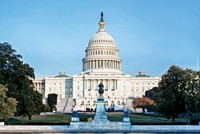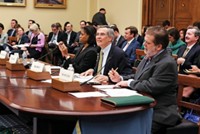Advertisement
Grab your lab coat. Let's get started
Welcome!
Welcome!
Create an account below to get 6 C&EN articles per month, receive newsletters and more - all free.
It seems this is your first time logging in online. Please enter the following information to continue.
As an ACS member you automatically get access to this site. All we need is few more details to create your reading experience.
Not you? Sign in with a different account.
Not you? Sign in with a different account.
ERROR 1
ERROR 1
ERROR 2
ERROR 2
ERROR 2
ERROR 2
ERROR 2
Password and Confirm password must match.
If you have an ACS member number, please enter it here so we can link this account to your membership. (optional)
ERROR 2
ACS values your privacy. By submitting your information, you are gaining access to C&EN and subscribing to our weekly newsletter. We use the information you provide to make your reading experience better, and we will never sell your data to third party members.
Legislation
Changes ahead with new U.S. Congress
More oversight of federal agencies anticipated, especially for the Environmental Protection Agency
by Britt Erickson; Jeff Johnson, special to C&EN; and Jyllian Kemsley
November 8, 2018
| A version of this story appeared in
Volume 96, Issue 45
Following the U.S. elections on Nov. 6, the Democratic Party will gain control over the House of Representatives when the new Congress convenes in January. The Republican Party will retain control of the Senate.

Among those newly elected to the House are several candidates with science backgrounds, including biochemical engineer and clean-energy entrepreneur Sean Casten (D-Ill.), nuclear engineer Elaine Luria (D-Va.), and nurse Lauren Underwood (D-Ill.). Overall, the House will have at least 18 members with science, technology, engineering, and mathematics (STEM) backgrounds or history of STEM advocacy, according to analysis by Maggie Koerth-Baker of FiveThirtyEight.
The switch in control of the House means leadership changes across the board, including new chairs of committees that handle science legislation and provide oversight of the Trump administration.
A jolting leadership change is expected on the House Committee on Science, Space, & Technology, where Rep. Lamar Smith (R-Texas), a climate change skeptic and vociferous critic of federal research, will likely be replaced by Rep. Eddie Bernice Johnson (D-Texas).
In her first post-election statement, Johnson underscored the importance of climate change research and education, “starting with acknowledging it is real.” She said she would prioritize science innovation; STEM education; robust federally funded R&D; defending scientists from political and ideological attacks; and “challenging misguided or harmful Administration actions.”

Other likely new committee chairs include Rep. Frank Pallone Jr. (D-N.J.) on the Committee on Energy & Commerce, which also covers environment and healthcare; Rep. Raúl Grijalva (D-Ariz.) on the Committee on Natural Resources; and Rep. Nita Lowey (D-N.Y.) on the Committee on Appropriations.
When asked what to expect from the new Congress, Anthony Pitagno, government affairs director for the American Chemical Society, predicted “bunts and singles, but not major legislation.” ACS will be looking to work with Congress on issues likely to gain bipartisan support, such as enhanced protection of critical natural materials, greater support for two-year technical education, and consistency in science research funding, Pitagno says. This funding, he notes, may be more restricted as the 2017 tax relief law goes into full effect and budgets are cut in response. ACS publishes C&EN.
Similarly, the American Association for the Advancement of Science (AAAS) plans to work with Congress where there is general support of science and technology, says Joanne Carney, AAAS’s director of government relations. She predicts that Congress may increasingly examine how science is used in federal government agencies. She expects oversight hearings to probe, for example, new Environmental Protection Agency policies restricting scientists’ participation on advisory boards and Department of Interior proposals to roll back protections of endangered species.
Andrew Rosenberg, director of the Union of Concerned Scientists Center for Science & Democracy, joins Carney in predicting more oversight hearings. The oversight goal is not to uncover scandals but to restore checks and balances across the different branches of government, he says.
Advertisement
Additional probable hearing topics include examination of weakened pollution control and fewer scientists serving in federal agencies, Rosenberg says. “We are losing scientists in government at an alarming rate,” he says. “EPA staff today is at levels not seen since the Reagan years in the 1980s, while the issues remain as complex as ever.”
Another area likely to get oversight hearings is EPA’s implementation of revisions to the Toxic Substances Control Act (TSCA). In the last two years, Democrats on the House Energy & Commerce Committee submitted at least four requests for hearings on EPA’s oversight of commercial chemicals. Republican leaders, however, held no hearings.
“We are extremely concerned that EPA’s increasingly limited review of chemical risk amounts to little more than a rubber-stamping process and does not reflect the higher level of scrutiny for new chemicals required by the TSCA reform law,” Democrats on the committee wrote to Republican leaders in August.
The House will also likely host more action around legalizing cannabis. Congress faces increasing pressure to relax federal cannabis laws: the elections added Utah and Missouri to the dozens of states that allow medical use, while Michigan became the 10th state to legalize recreational use. “With such overwhelming public support for marijuana legalization, even including majorities of Republicans and older Americans, there’s only so long that the federal government can continue to hold out,” says Maria McFarland Sánchez-Moreno, executive director of the Drug Policy Alliance, a group that aims to end criminalization of cannabis.
CORRECTION:
This story was updated on Nov. 8, 2018, to correct Eddie Bernice Johnson's party affiliation in her photo caption. She is a Democrat, not a Republican.




Join the conversation
Contact the reporter
Submit a Letter to the Editor for publication
Engage with us on Twitter